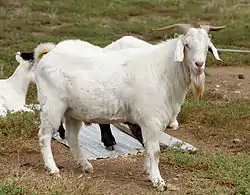bode
English
Pronunciation
- (Received Pronunciation) IPA(key): /bəʊd/
- (General American) IPA(key): /boʊd/
- Rhymes: -əʊd
- Homophone: bowed (in one sense)
Etymology 1
Verb from Middle English boden, from Old English bodian (“announce, foretell”), from Proto-Germanic *budōną (“to proclaim, announce, lere, instruct”), from Proto-Indo-European *bʰewdʰ- (“to be awake, perceive fully”). See bid.
Noun from Middle English bod, from Old English bod, from Proto-Germanic *budą (“message, offer”).
Since 1740 also a shortening of forebode.
Verb
bode (third-person singular simple present bodes, present participle boding, simple past and past participle boded)
- (transitive, intransitive) To indicate by signs, as future events; to be an omen of; to portend or foretell.
- c. 1610-11, William Shakespeare, The Tempest, Act III, Scene i:
- O heaven, O earth, bear witness to this sound,
- And crown what I profess with kind event
- If I speak true; if hollowly invert
- What best is boded me to mischief: I,
- Beyond all limit of what else i' th' world,
- Do love, prize, honour you.
- c. 1610-11, William Shakespeare, The Tempest, Act III, Scene i:
- (intransitive, followed by well or ill) To betoken or augur something good or bad that would happen in the future.
- Dryden
- Whatever now / The omen proved, it boded well to you.
- Dryden
Translations
|
Noun
bode (plural bodes)
- An omen; a foreshadowing.
- Chaucer
- The owl eke, that of death the bode bringeth.
- Chaucer
Etymology 2
From Middle English bod, from Old English bod (“a bidding”), from Proto-Germanic *budą (“a bidding, offer”). Cognate with Swedish bud, Dutch bod, Icelandic boð, Faroese boð, Norwegian Nynorsk bod, Norwegian Bokmål bud. Compare also Old Saxon gibod, German Gebot. See bid.
Noun
bode (plural bodes)
- (obsolete or dialectal) A bid; an offer.
- (Can we find and add a quotation of Sir Walter Scott to this entry?)
Etymology 3
From Middle English bode, from Old English boda (“messenger, forerunner”), from Proto-Germanic *budô (“messenger”). Cognate with Dutch bode (“messenger, harbinger”), German Bote (“messenger”).
Noun
bode (plural bodes)
- A messenger; a herald.
- (Can we find and add a quotation of Robertson to this entry?)
Etymology 4
From Middle English bod, abod (“a stopping”).
Etymology 5
Inflected form of bide.
References
- “bode” in Douglas Harper, Online Etymology Dictionary, 2001–2019.
Chichewa
Pronunciation
- IPA(key): /ˈɓó.ɗe/
Czech
Pronunciation
- IPA(key): /ˈbodɛ/
- Rhymes: -odɛ
- Hyphenation: bo‧de
Dutch
Pronunciation
- IPA(key): /ˈboːdə/
Audio (file)
Etymology 1
From Middle Dutch bōde, from Old Dutch bodo, from Proto-Germanic *budô.
Derived terms
- bodes
- bodin
- bodenbrood
- bodenkamer
- bodenloon
- dienstbode
- geluksbode
- gerechtsbode
- ijlbode
- jobsbode
- renbode
- snelbode
- onheilsbode
- postbode
Etymology 2
See the etymology of the main entry.
Further reading
- M. J. Koenen & J. Endepols, Verklarend Handwoordenboek der Nederlandse Taal (tevens Vreemde-woordentolk), Groningen, Wolters-Noordhoff, 1969 (26th edition) [Dutch dictionary in Dutch]
Galician
Etymology
Unknown. Probably from a pre-Roman substrate of Iberia.
Pronunciation
- IPA(key): /ˈbɔðe̝/
Derived terms
- bode seixo
References
- “bode” in Dicionario de Dicionarios do galego medieval, SLI - ILGA 2006-2012.
- “bode” in Xavier Varela Barreiro & Xavier Gómez Guinovart: Corpus Xelmírez - Corpus lingüístico da Galicia medieval. SLI / Grupo TALG / ILG, 2006-2016.
- “bode” in Dicionario de Dicionarios da lingua galega, SLI - ILGA 2006-2013.
- “bode” in Tesouro informatizado da lingua galega. Santiago: ILG.
- “bode” in Álvarez, Rosario (coord.): Tesouro do léxico patrimonial galego e portugués, Santiago de Compostela: Instituto da Lingua Galega.
Lamboya
References
- Rina, A. Dj.; Kabba, John Lado B. (2011), “bode”, in Kamus Bahasa Lamboya, Kabupaten Sumba Bakat [Dictionary of Lamboya Language, West Sumba Regency], Waikabubak: Dinas Kebudayaan dan Pariwisata, Kabupaten Sumba Bakat, page 10
Middle Dutch
Etymology
From Old Dutch bodo, from Proto-Germanic *budô.
Pronunciation
- IPA(key): /ˈbɔːdə/
Inflection
| Weak masculine | ||
|---|---|---|
| Singular | Plural | |
| Nominative | bōde | bōden |
| Accusative | bōde | bōden |
| Genitive | bōden | bōden |
| Dative | bōde | bōden |
Descendants
- Dutch: bode
Norwegian Nynorsk
Portuguese

Etymology
Unknown. Probably from a pre-Roman substrate of Iberia.
Pronunciation
- (Portugal) IPA(key): /ˈbɔˑðɨ/
- (Brazil) IPA(key): /ˈbɔˑd͡ʒi/
- (Northeast Brazil) IPA(key): /ˈbɔˑdi/
- (South Brazil) IPA(key): /ˈbɔˑde/
- Hyphenation: bo‧de
Synonyms
- (goat buck): cabrão